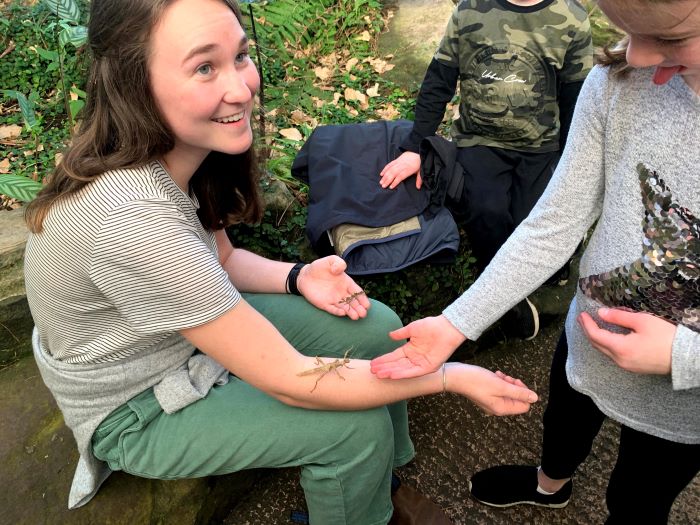Watson Fellow Allison Monroe ’19 will use funding to continue research on Indigenous knowledge and environmental sustainability

Photo courtesy Allison Monroe
CONWAY, Ark.
(April 21, 2022) – Allison Monroe, a 2019 graduate of Hendrix College, has received
a National Science Foundation (NSF) Graduate Research Fellowship, one of the nation’s most prestigious honors for
graduate students studying in STEM (science, technology, engineering
or mathematics) fields.
As an NSF
Graduate Research Fellow, Monroe will have a five-year fellowship with three
years of financial support, including an annual stipend of $34,000 and a cost
of education allowance of $12,000 to the University of Montana, where she
currently studies Indigenous knowledge and environmental sustainability.
“Allison’s
accomplishments started her first year at Hendrix when she secured an
internship at the Smithsonian Museum of Natural History,” said Hendrix
Associate Professor of Biology and Environmental Studies Program Chair Dr.
Maureen McClung. “From there, she led her own field and lab research project on
the ecology of wasps in Arkansas, mapped conservation corridors in Costa Rica,
and helped launch the Hendrix Naturalists Club. Her record demonstrates her
motivation to improve nature conservation, and now her graduate work aims to
incorporate Indigenous ecological knowledge in this effort. We’re so glad that
NSF believes in Allison like we do here at Hendrix.”
Monroe holds
a Bachelor of Arts in biology from Hendrix, where she received a Thomas J.
Watson Fellowship. She is currently enrolled in a Master of Science program
focused on Indigenous knowledge and environmental sustainability, housed in the
University of Montana’s Department of Environmental Studies. Monroe’s research
involving traditional ecological knowledge, models of biodiversity, and
landscape conservation focuses on natural resource conflict resolution with and
for historically oppressed communities. Her ultimate career goal is to work for
an NGO (non-governmental organization) as a community collaboration manager, or
“any position that allows [her] to maintain a multiculturally-engaged research
and teaching program, informs management initiatives, and advances scientific
understanding.”
Monroe credits
the broad-based mentoring she received at Hendrix with helping her to transition
away from a pre-med path and toward biology in her undergraduate studies, then
to earn the Watson Fellowship. “There are so many professors who I could
— and should — give credit to, but then I would be listing nearly everyone who
is still there,” she said. “The interdisciplinary education I received at
Hendrix inspired my application to the Watson Fellowship. I remember working
diligently with Dr. McClung, Dr. [Lilian] Contreras-Silva, Britt Anne Murphy,
and so many others on my application. I was stunned when I got the award, and
I’m still so thankful for it.”
Designing her own year-long project put
Monroe in rural areas of Madagascar, South Africa, Scotland, and Costa Rica, learning
cultural values and seeking to understand conservation implications within
exploited communities. “Repeatedly, I learned that lasting conservation
projects depend on community involvement, but that community involvement itself
is a culturally complex problem to address,” she said.
Her Watson
travels led her to her current area of research.
“When my Watson Fellowship was cut short
due to covid, I found myself back in Arkansas with new eyes,” she said. “I was
suddenly very aware that my experiences abroad needed to be applied in the U.S.
I began researching something along the lines of ‘Indigenous conservation U.S.’
and Dr. Rosalyn LaPier, who is Blackfeet and Métis, popped up. It only took one
read through Dr. LaPier’s work for me to apply to learn from her. She’s now my
advisor [at the University of Montana].”
Monroe says the Hendrix Odyssey Program and
the Murphy Scholars Program played a role in her successes, as they funded her
earlier projects and experiences while honing her writing skills, particularly
for grant writing. “I am confident in writing for these competitive and
challenging applications, and I have been commended on my ability to articulate
my story and interests,” she says. “The NSF-GRFP is one of the most competitive
research grants in the U.S., and one of my reviewers said my application was
among the best they have read. That’s because of the experience I gained with
grant writing while at Hendrix.”
Monroe
has also enrolled in a University of Montana certificate program in Natural
Resource Conflict Resolution to help address historical power imbalances and
general conflicts in resource use and management. “When diverse groups work
together to cross boundaries for a shared purpose, they can dramatically expand
what is possible,” she said. “That’s at the heart of my graduate experience:
new possibilities.”
She emphasized that Hendrix College has,
in many ways, helped form her as a person. “The mentorship and community
support I received while at Hendrix really stands out as foundational to not
just who I am today, but to who I hope to be in my future career as well.”
About Hendrix
College
A private
liberal arts college in Conway, Arkansas, Hendrix College consistently earns
recognition as one of the country’s leading liberal arts institutions, and is
featured in Colleges That Change Lives: 40 Schools That Will Change the
Way You Think About Colleges. Its academic quality and rigor, innovation,
and value have established Hendrix as a fixture in numerous college guides,
lists, and rankings. Founded in 1876, Hendrix has been affiliated with the
United Methodist Church since 1884. To learn more, visit www.hendrix.edu.